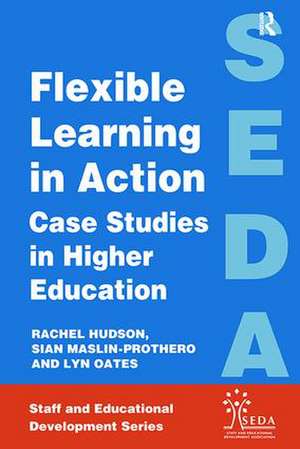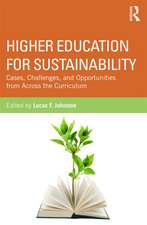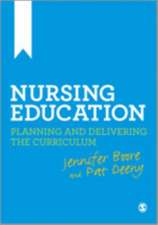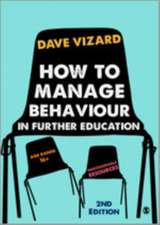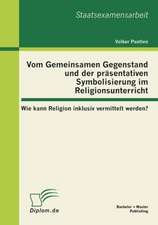Flexible Learning in Action: Case Study in Higher Education: SEDA Series
Autor Rachel Hudson, Oates Lyn, Sian Maslin-Protheroen Limba Engleză Hardback – 28 iul 2017
| Toate formatele și edițiile | Preț | Express |
|---|---|---|
| Paperback (1) | 333.17 lei 43-57 zile | |
| Taylor & Francis – dec 1997 | 333.17 lei 43-57 zile | |
| Hardback (1) | 931.20 lei 43-57 zile | |
| Taylor & Francis – 28 iul 2017 | 931.20 lei 43-57 zile |
Din seria SEDA Series
-
 Preț: 244.68 lei
Preț: 244.68 lei -
 Preț: 245.74 lei
Preț: 245.74 lei -
 Preț: 244.44 lei
Preț: 244.44 lei -
 Preț: 257.47 lei
Preț: 257.47 lei -
 Preț: 258.95 lei
Preț: 258.95 lei -
 Preț: 246.31 lei
Preț: 246.31 lei -
 Preț: 245.31 lei
Preț: 245.31 lei -
 Preț: 245.16 lei
Preț: 245.16 lei -
 Preț: 186.82 lei
Preț: 186.82 lei - 13%
 Preț: 304.07 lei
Preț: 304.07 lei - 13%
 Preț: 349.81 lei
Preț: 349.81 lei - 15%
 Preț: 466.59 lei
Preț: 466.59 lei -
 Preț: 354.28 lei
Preț: 354.28 lei -
 Preț: 396.62 lei
Preț: 396.62 lei - 26%
 Preț: 159.69 lei
Preț: 159.69 lei -
 Preț: 486.47 lei
Preț: 486.47 lei - 15%
 Preț: 471.63 lei
Preț: 471.63 lei -
 Preț: 440.69 lei
Preț: 440.69 lei -
 Preț: 440.61 lei
Preț: 440.61 lei - 18%
 Preț: 1002.63 lei
Preț: 1002.63 lei -
 Preț: 351.38 lei
Preț: 351.38 lei - 18%
 Preț: 1061.93 lei
Preț: 1061.93 lei - 26%
 Preț: 1014.74 lei
Preț: 1014.74 lei - 18%
 Preț: 1107.61 lei
Preț: 1107.61 lei -
 Preț: 349.80 lei
Preț: 349.80 lei -
 Preț: 196.36 lei
Preț: 196.36 lei -
 Preț: 383.45 lei
Preț: 383.45 lei -
 Preț: 414.76 lei
Preț: 414.76 lei - 18%
 Preț: 1000.27 lei
Preț: 1000.27 lei - 18%
 Preț: 1000.27 lei
Preț: 1000.27 lei - 15%
 Preț: 669.94 lei
Preț: 669.94 lei - 27%
 Preț: 170.81 lei
Preț: 170.81 lei - 26%
 Preț: 240.89 lei
Preț: 240.89 lei
Preț: 931.20 lei
Preț vechi: 1253.49 lei
-26% Nou
Puncte Express: 1397
Preț estimativ în valută:
178.18€ • 186.54$ • 147.44£
178.18€ • 186.54$ • 147.44£
Carte tipărită la comandă
Livrare economică 07-21 aprilie
Preluare comenzi: 021 569.72.76
Specificații
ISBN-13: 9781138419735
ISBN-10: 1138419737
Pagini: 208
Dimensiuni: 156 x 234 x 21 mm
Greutate: 0.45 kg
Ediția:1
Editura: Taylor & Francis
Colecția Routledge
Seria SEDA Series
Locul publicării:Oxford, United Kingdom
ISBN-10: 1138419737
Pagini: 208
Dimensiuni: 156 x 234 x 21 mm
Greutate: 0.45 kg
Ediția:1
Editura: Taylor & Francis
Colecția Routledge
Seria SEDA Series
Locul publicării:Oxford, United Kingdom
Cuprins
Introduction, Rachel Hudson, Sian Maslin-Prothero, Lyn Oates; Flexibility for Learners on Campus; Chapter 1 Teaching Business Writing Online: Towards Developing Student Learning and Responsibility in a Flexible Learning Environment, Robert Fulkerth; Chapter 2 Don't Lecture Me about Flexible Learning! Being Flexible in the Delivery of an Undergraduate Education Studies Module, Lesley Dunning; Chapter 3 Improving Independent Learning with Aural German Programmes, Susanne Mühlhaus, Martin Löschmann; Chapter 4 Peer Mentoring through Peer-Assisted Study Sessions, Angus Witherby; Chapter 5 Teaching by E-Mail, Chris Smith; Chapter 6 Using a Shell for Delivery and Support for Case-Based Learning in a Networked Environment, Kathy Buckner, Elisabeth Davenport; Chapter 7 Learning via Multimedia: A Study of the Use of Interactive Multimedia to Teach Chemistry, Chris Smith, Keith Haddon, Edward Smith, Don Bratton; Flexibility for Work-Based Learners; Chapter 8 Flexible Learning for Australian Club Managers, Helen Breen, Nerilee Hing, Paul Weeks; Chapter 9 Distance Learning in Post-Registration Nurse Education, Maggie Grundy, Sally Lawton, Armida Taylor; Chapter 10 Professional Development through Reflective Inquiry, Karen McArdle, Ian McGowan; Chapter 11 Workplace Learning: Removing the Barriers, Phil Askham; Chapter 12 Empowering School Managers through Flexible Learning, David Oldroyd; Chapter 13 Off the Cuff and on the Cusp: A Flexible Approach to Teacher Development, Philip Garner, Chris Longman; Chapter 14 Flexible Learning in Modular Programmes for Professional Studies, Lyn Shipway; Chapter 15 A Flexible Programme in Applied Studies in Education and Training, Andrina McCormack; Flexible Approaches to Skills Development; Chapter 16 Flexible Maths, Sybil Cock, Poppy Pickard; Chapter 17 Profiling Study and Communication Styles for Non-Traditional Students, Jenny Ure; Chapter 18 Flexibility in Teaching and Learning Schemes, Philip Gillies-Denning; Chapter 19 But This Isn't How an English Class is Supposed tobe…, Williatn Macauley, Gian Pagnucci; Chapter 20 Student SkillPacks, Rosie Bingham, Sue Drew; Chapter 21 An Interactive Library Skills Workbook for Engineering Undergraduates, Clare Bainbridge; Chapter 22 Introducing Computer Networks as a Research Tool to First-Year Postgraduates, Richard Steward; Institutional Strategies for Supporting Flexible Learning; Chapter 23 Flexible Learning: Is it as Good for the University as it is for the Students?, William Lynch; Chapter 24 Adopting a Mixed-Mode Approach to Teaching and Learning: A Case Study of the University of Luton, Stephen Fallows; Chapter 25 Flexible Learning — Where Does the Library Fit in?, Tony Cavanagh; Chapter 26 Flexible Learning as a Management Issue, Patrick McGhee; Chapter 27 Flexible Access to Learning Resources Through Electronic Course Delivery, Philip Barker; Chapter 28 An Open Learning Centre at the University of Bristol, Cathy Hole; Chapter 29 Staff Development for Flexible Learning at Stockport College, Jackie Robinson; Chapter 30 Establishing Flexible Learning in a Conventional Institution — Getting the Strategy Right, Sally Anderson; Chapter 31 The Flexible Learning Initiative at Loughborough University, Winnie Wade; conclusion Conclusion;
Notă biografică
Rachel Hudson is Open Learning Facilitator, Faculty of the Built Environment, University of the West of England, Bristol. Sian Maslin-Prothero is a lecturer in the Department of Nursing and Midwifery Studies, Nottingham University. Lyn Oates is Learning and Teaching Support Manager, Cheltenham and Gloucester College of Higher Education.
